MAAG Artist Profile - Shulla Jaques
17th October 2022
Shulla Jaques
I can’t remember not wanting to paint, though I do remember the first time it clicked that art didn’t necessarily have to be oil paintings in gold frames when in 1983 I saw the travelling exhibition of photographs by David Hockney at the Hayward Gallery. I found his montages of separate polaroid photographs to make a whole intriguing and exciting and so different from anything we were being taught. It felt thrilling and liberating. Although it’s taken nearly 40 years to get back to painting I still remind myself of this feeling when I think my art practice is becoming too prescriptive.
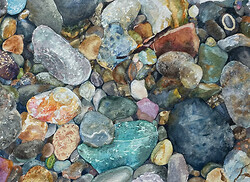
After several decades of ‘following the drum’ I feel very fortunate to have been able to return home and to settle in Dorset. Although it was tricky at first to keep the creative spark alive whilst juggling work and family commitments I was grateful to be a member of The Milton Abbas Art Group which provided the opportunity of making art even when those two-hours in the week was the only time to be a little bit creative. It was, and still is, motivating to meet like-minded artists and to learn from others.
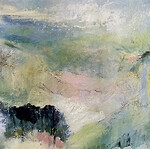
I was so lucky to have worked for a short time in the museum and cultural heritage sector as an accredited conservator of works of art on paper. Being up close to a variety of works by artists spanning the centuries from the 15th to the 20th was a privilege and an education that has really helped me understand materials and techniques.
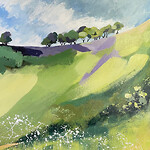
Having said that, it’s one thing knowing a little about printing and painting processes, it’s another making my own art. For the last three years I have been able to concentrate more on my art practice, taking watercolour classes with William Cooper, sketchbook workshops with Karen Stamper, collage workshops with Lewis Noble, and learning to have fun whilst exploring abstract landscape painting with Louise Fletcher and her Find Your Joy course. Most recently I have taken possession of a gelli plate and find myself lost in hours of monoprinting magic.
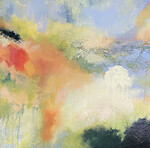
Apart from being taught art-making fundamentals regular contact with other creatives has taught me that creativity doesn’t just happen, making time to nurture your instinct to create, even if it’s a ten minute drawing every day is essential. Regular practice not only improves your technique it also helps you find you. If like me you can sometimes feel overwhelmed or have self-doubt just realising that actually the only person you should be painting (art-making) for is you – playing with new materials, exploring colour combinations, investigating different subjects, whatever interests you at the time – is a powerful release. I believe too that not trying to paint to please others makes for more authentic art.
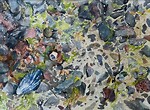
Over the last few years I have been drawn to the natural world and enjoy capturing its detail as well as responding to its ever changing character. A nod to growing up by the sea I record place and time through watercolour painting, usually on Two Rivers handmade paper, of material found on the shoreline; my interest sparked by the abstract forms and patterns encased in stones and shells. In contrast, living in an AONB and conservation area is a long way from my childhood home in a leafy suburb of Bournemouth. I have been struck by how little I knew of the changing seasons and power of the countryside. My art is therefore developing and becoming more abstract in a bid to capture my emotional response to the rural landscape through acrylic, collage and mixed media.
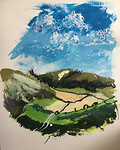
When in doubt however I remind myself that there’s always something to learn from whatever mark making or creative activity I do, the key is to just put something down on paper and if all else fails, I always have my chickens to sketch.
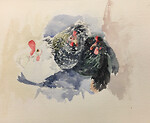
I’m taking some time out to explore botanical printing taught by local artist Caroline Soer and planning a new series of slightly larger mixed media works on board. Meanwhile, I hope you enjoy browsing the art on the website as much as I have enjoyed making my contribution.
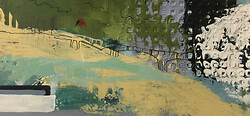
Quotes I like:
Art washes away from the soul the dust of everyday life.
Pablo Picasso
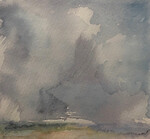
Don’t think. Thinking is the enemy of creativity. It’s self-conscious, and anything self-conscious is lousy. You can’t try to do things. You simply must do things.
Ray Bradbury
Painting from nature is not copying the object, it's realising one's sensations.
Paul Cezanne
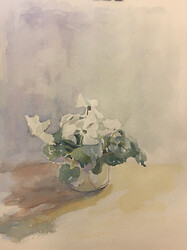
The artist must train not only his eye but also his soul. Wassily Kandinsky
He who works with his hands is a labourer. He who works with his hands and his head is a craftsman. He who works with his hands and his head and his heart is an artist.
Saint Francis of Assisi
Practice what you know and it will help you to make clear what you do not know. Rembrandt
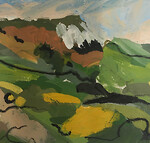
Drawing is like making an expressive gesture, with the advantage of permanence. Henri Matisse
It is only by drawing often, drawing everything, drawing incessantly, that one fine day you discover, to your surprise, that you have rendered something in its true character. Camille Pissarro
It is very good advice to believe only what an artist does, rather than what he says about his work. David Hockney
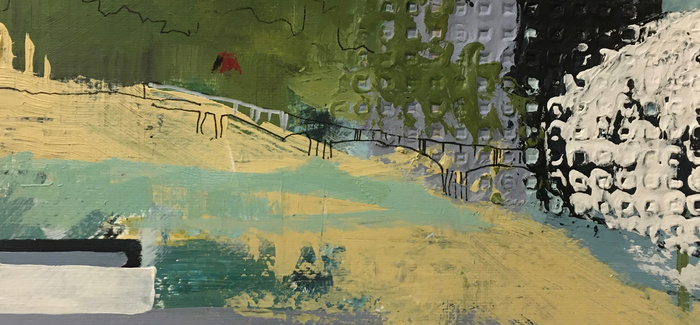
I can’t remember not wanting to paint, though I do remember the first time it clicked that art didn’t necessarily have to be oil paintings in gold frames when in 1983 I saw the travelling exhibition of photographs by David Hockney at the Hayward Gallery. I found his montages of separate polaroid photographs to make a whole intriguing and exciting and so different from anything we were being taught. It felt thrilling and liberating. Although it’s taken nearly 40 years to get back to painting I still remind myself of this feeling when I think my art practice is becoming too prescriptive.

After several decades of ‘following the drum’ I feel very fortunate to have been able to return home and to settle in Dorset. Although it was tricky at first to keep the creative spark alive whilst juggling work and family commitments I was grateful to be a member of The Milton Abbas Art Group which provided the opportunity of making art even when those two-hours in the week was the only time to be a little bit creative. It was, and still is, motivating to meet like-minded artists and to learn from others.

I was so lucky to have worked for a short time in the museum and cultural heritage sector as an accredited conservator of works of art on paper. Being up close to a variety of works by artists spanning the centuries from the 15th to the 20th was a privilege and an education that has really helped me understand materials and techniques.

Having said that, it’s one thing knowing a little about printing and painting processes, it’s another making my own art. For the last three years I have been able to concentrate more on my art practice, taking watercolour classes with William Cooper, sketchbook workshops with Karen Stamper, collage workshops with Lewis Noble, and learning to have fun whilst exploring abstract landscape painting with Louise Fletcher and her Find Your Joy course. Most recently I have taken possession of a gelli plate and find myself lost in hours of monoprinting magic.

Apart from being taught art-making fundamentals regular contact with other creatives has taught me that creativity doesn’t just happen, making time to nurture your instinct to create, even if it’s a ten minute drawing every day is essential. Regular practice not only improves your technique it also helps you find you. If like me you can sometimes feel overwhelmed or have self-doubt just realising that actually the only person you should be painting (art-making) for is you – playing with new materials, exploring colour combinations, investigating different subjects, whatever interests you at the time – is a powerful release. I believe too that not trying to paint to please others makes for more authentic art.

Over the last few years I have been drawn to the natural world and enjoy capturing its detail as well as responding to its ever changing character. A nod to growing up by the sea I record place and time through watercolour painting, usually on Two Rivers handmade paper, of material found on the shoreline; my interest sparked by the abstract forms and patterns encased in stones and shells. In contrast, living in an AONB and conservation area is a long way from my childhood home in a leafy suburb of Bournemouth. I have been struck by how little I knew of the changing seasons and power of the countryside. My art is therefore developing and becoming more abstract in a bid to capture my emotional response to the rural landscape through acrylic, collage and mixed media.

When in doubt however I remind myself that there’s always something to learn from whatever mark making or creative activity I do, the key is to just put something down on paper and if all else fails, I always have my chickens to sketch.

I’m taking some time out to explore botanical printing taught by local artist Caroline Soer and planning a new series of slightly larger mixed media works on board. Meanwhile, I hope you enjoy browsing the art on the website as much as I have enjoyed making my contribution.

Quotes I like:
Art washes away from the soul the dust of everyday life.
Pablo Picasso

Don’t think. Thinking is the enemy of creativity. It’s self-conscious, and anything self-conscious is lousy. You can’t try to do things. You simply must do things.
Ray Bradbury
Painting from nature is not copying the object, it's realising one's sensations.
Paul Cezanne

The artist must train not only his eye but also his soul. Wassily Kandinsky
He who works with his hands is a labourer. He who works with his hands and his head is a craftsman. He who works with his hands and his head and his heart is an artist.
Saint Francis of Assisi
Practice what you know and it will help you to make clear what you do not know. Rembrandt

Drawing is like making an expressive gesture, with the advantage of permanence. Henri Matisse
It is only by drawing often, drawing everything, drawing incessantly, that one fine day you discover, to your surprise, that you have rendered something in its true character. Camille Pissarro
It is very good advice to believe only what an artist does, rather than what he says about his work. David Hockney
